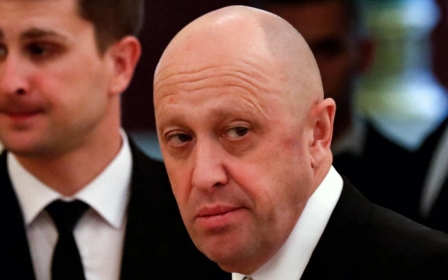UN Security Council votes to end peacekeeping mission in Mali, US blames Wagner

The UN Security Council has unanimously voted to end a 13,000-strong peacekeeping mission in Mali which has been there for a decade, after Bamako demanded they leave.
The US attributed the move to Russia's Wagner mercenary group. The vote took place on Friday after Mali's Foreign Minister Abdoulaye Diop said the peacekeepers had failed and Malians no longer trusted them.
The Wagner Group, a private military company based in Russia, has been making significant inroads into Africa, becoming an important vehicle for Moscow's strategic reach into the continent.
Established by Russian businessman Yevgeny Prigozhin, who until recently was known for his close ties to the Kremlin, the Wagner Group gained notoriety for its covert military operations and expansive trade in mining and weapons procurements.
Prigozhin is said to currently be exiled in Belarus after a short-lived mutiny that saw the group challenging Putin and the Russian state.
Stay informed with MEE's newsletters
Sign up to get the latest alerts, insights and analysis, starting with Turkey Unpacked
The French-drafted resolution that was adopted asked the mission to begin "the cessation of its operations, transfer of its tasks, as well as the orderly and safe drawdown and withdrawal of its personnel, with the objective of completing this process by 31 December 2023".
The end of the mission, which is referred to as MINUSMA, comes after years of strained relations and governmental constraints that have hampered peacekeeping efforts both in the air and on the ground.
The challenges arose after Mali partnered with Russia's Wagner group in 2021.
"What isn't as widely known is that [Prigozhin] helped engineer that departure to further Wagner's interests," White House national security spokesman John Kirby said.
"We know that senior Malian officials worked directly with Prigozhin employees to inform the UN secretary-general that Mali had revoked consent for the MINUSMA mission."
The resolution authorises MINUSMA to, "within its immediate vicinity", respond to imminent threats of violence to civilians and contribute to the safe, civilian-led delivery of humanitarian assistance until 30 September.
The resolution also asks UN Secretary-General Antonio Guterres to work with the Malian authorities on a plan to transfer MINUSMA's tasks and present it to the Security Council by 15 August.
Until the end of the year, MINUSMA has the authority to ensure the security of UN staff, facilities, convoys, installations, equipment and associated individuals.
They're also permitted to carry out operations to rescue UN personnel and humanitarian workers who are in danger, as well as to perform medical evacuations.
A 'sovereign' decision
Mali's ambassador to the UN, Issa Konfourou, said that Mali would fully cooperate with the UN.
"The government regrets that the Security Council continues to consider the situation in Mali as a threat to international peace and security," Konfourou said.
"Mali remains open to cooperating with all partners that wish to work with it, subject to respecting the guiding principles of our state policies."
Some experts expressed concern that the security conditions in Mali may deteriorate once the mission officially withdraws.
They argue this would leave Mali's under-resourced military to confront militants, who maintain control over vast regions in the northern and central desert areas, alongside only about 1,000 fighters from the Wagner Group, Reuters reported.
Russia's Deputy UN Ambassador Anna Evstigneeva told the Security Council that Mali had made a "sovereign decision".
"We would like to confirm our support for Bamako in its aspiration to take full responsibility and play the leading role in stabilising the Malian state," she said.
"Russia will continue to provide comprehensive support to Mali for normalising the situation in that country on a bilateral basis."
Middle East Eye delivers independent and unrivalled coverage and analysis of the Middle East, North Africa and beyond. To learn more about republishing this content and the associated fees, please fill out this form. More about MEE can be found here.





